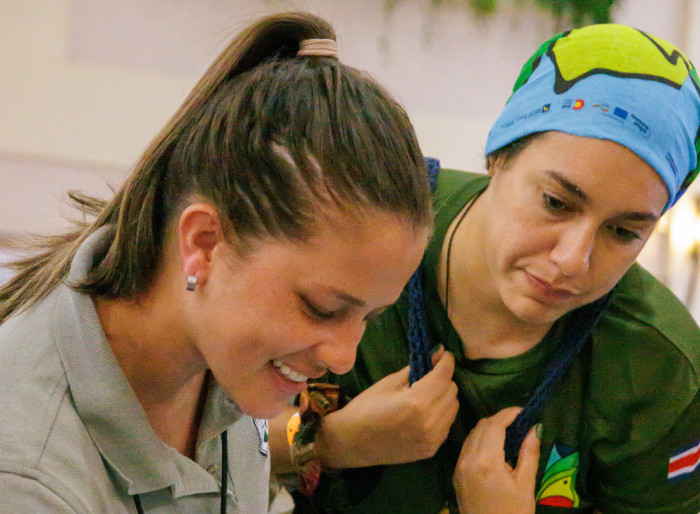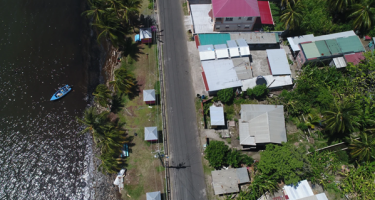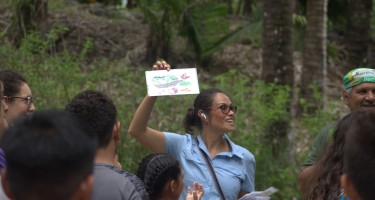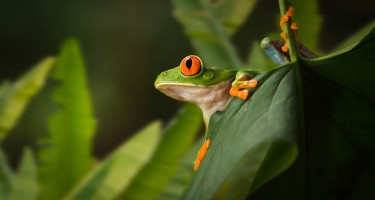Women Park Rangers: Costa Rica Advances a Conservation Model Grounded in Gender Equality
Ciudad Quesada hosted the second National Women Park Rangers Conference, a key event for both biodiversity conservation and gender equality. More than 95 women staff members from Costa Rica’s National System of Conservation Areas (SINAC, from its acronym in Spanish), a division of the Ministry of Environment and Energy (MINAE, from its acronym in Spanish), came together to continue developing and strengthening an Institutional Gender Policy.

© GIZ / ACCIÓN Clima
Recognizing the importance of protecting biodiversity through a lens of justice and equity, Costa Rica championed the inclusion of a new target during negotiations for the Kunming-Montreal Global Biodiversity Framework (GBF). This became Target 23, which seeks to close gender gaps across all biodiversity action-related matters, promoting the full, equitable, and effective participation of women and girls, and recognizing their rights to land, natural resources, and decision-making.
To help meet this target, SINAC organized the conference’s second edition with support from the “Costa Rica is Biodiversity 30x30” project – a far-reaching initiative aligned with Target 3 of the GBF, which aims to restore and conserve Costa Rica’s biodiversity.
The project, funded by the European Union through the Euroclima Program and implemented by the Spanish Agency for International Development Cooperation (AECID, from its acronym in English), plays a crucial role in restoring and maintaining ecosystem services using effective conservation measures to address climate change.
Integrating a gender perspective into conservation is key to creating more inclusive and resilient solutions. Women park rangers, who work under diverse work conditions – such as working while pregnant or breastfeeding – need safe and adaptive work environments tailored to their specific needs. This approach ensures that their voices are heard and their contributions valued, thus building a more equitable and effective workplace.
“ It’s important to include women in the protection and care of biodiversity, because we bring a strong sense of awareness. That connection with our communities, and bringing this sensitivity, this love and dedication that women offer – it’s something unique. Men also contribute, but in a different way. That’s why we’re a team; we complement each other.
— Viviana Arias Quesada, park ranger from the Central Pacific Conservation Area and member of SINAC’s Fire Management Brigade. ”

© GIZ / ACCIÓN Clima
“ This conference is a valuable opportunity to bring together two fundamental commitments: biodiversity conservation and gender equality. At AECID, we celebrate and support spaces that strengthen the leadership of women park rangers. Their role is absolutely vital to preserving all the species that call this country home.
— Christine Follana, AECID project lead in Costa Rica. ”
In 2023, the first women park rangers conference marked a pivotal shift from agreement to action: It produced a roadmap that laid the foundation for real structural change – integrating gender equity into SINAC’s management and creating a distinct before and after for women’s participation and their role in Costa Rica’s biodiversity protection efforts.
That first step, made possible through close coordination between SINAC and the German Development Cooperation - GIZ, also created a space for raising awareness regarding the challenges that women face in conservation, as well as strengthening their ability to address gender disparities.
“ Working alongside women park rangers not only strengthens their participation in decision-making around climate action and biodiversity management, but also validates their experiences and knowledge, contributing to the development of a more inclusive and sustainable environmental conservation strategy. On behalf of the German Development Cooperation - GIZ, we recognize Costa Rica’s leadership in including Target 23 in the Kunming-Montreal plan, reflecting an understanding of how gender roles shape conservation and the sustainable use of biodiversity.
— Johannes Kissel, Director of GIZ’s project ACCIÓN Clima. ”

© GIZ / ACCIÓN Clima
As a result of the first conference and two follow-up capacity-building workshops, SINAC established an Ad-Hoc Gender Committee. Among its initiatives is a proposal to create an internal Gender Unit to address staff needs around gender equality.
“ From our lived experiences, knowledge, and emotions, we raise a single voice: that of SINAC’s women park rangers. This conference was an act of affirmation, of unity, and of recognition. We spoke with conviction and from a collective vision, to be heard, valued, and respected – as women and as public servants protecting our country’s biodiversity.
— Yocelin Ríos, coordinator of SINAC’s Ad-Hoc Gender Committee. ”
Costa Rica has emerged as a regional leader in integrating gender perspectives into its conservation policies. The country’s evolving experience may serve as a replicable model for others in the region looking to weave gender equity into their environmental protection strategies.
“ The first conference proved that change is possible – that there’s a real need to open up spaces to share knowledge and discuss the life experiences that have made it possible to forge a path to closing the identified gaps. It was their own voices that we, as leaders, listened to. This was not a top-down initiative. It was a collaborative process, where they, from their own perspectives, helped us determine the paths we should follow.
— Cindy Quesada Hernández, Minister for the Condition of Women. ”
The second Women Park Rangers Conference represents another meaningful step toward a more equitable and sustainable future – one where biodiversity protection and women’s inclusion in decision-making go hand in hand, strengthening Costa Rica’s commitment to climate action and the stewardship of its natural heritage.

© GIZ / ACCIÓN Clima
For more information:
The German Development Cooperation - GIZ is a German government organization that supports the country’s international cooperation efforts for sustainable global development. For more than 60 years, GIZ has worked in Central America to help build a more inclusive, just, and resilient region. Its cooperation model is based on implementing integrated solutions and combining resources and capacities across projects and countries to address key challenges in climate, environmental, social, and governance issues.
AECID, as defined by the Spanish Cooperation Act, is the state agency attached to the Ministry of Foreign Affairs, European Union and Cooperation. It is responsible for promoting, planning, coordinating, managing, and implementing Spain’s public policies on sustainable development cooperation, humanitarian action, and education for sustainable development and global citizenship.
La AECID se define en la Ley de Cooperación como la agencia estatal adscrita al Ministerio de Asuntos Exteriores, Unión Europea y Cooperación, responsable del fomento, programación, coordinación operativa, gestión y ejecución de las políticas públicas de cooperación española para el desarrollo sostenible, acción humanitaria y educación para el desarrollo sostenible y la ciudadanía global.
Euroclima is the European Union’s (EU) flagship program for strengthening its partnership with Latin America and the Caribbean (LAC) to support a just and sustainable transition. It promotes coordinated action and dialogue at both national and regional levels. By improving enabling conditions, catalyzing key initiatives in priority sectors, and facilitating both access to and the mobilization of climate and green finance and investment, the EU and LAC countries are laying the foundation for the deep transformation needed to collaborate effectively and confront the urgent and existential threats we face.
Euroclima is part of the EU’s Global Gateway strategy and is co-financed by the European Union and the Federal Republic of Germany through the Federal Ministry for Economic Cooperation and Development (BMZ). The program is implemented under the Team Europe approach, through the collaborative work of eight agencies from EU Member States and the United Nations: the Spanish Agency for International Development Cooperation (AECID), the Agence française de développement Group (AFD and Expertise France), the Economic Commission for Latin America and the Caribbean (ECLAC), the International and Ibero-American Foundation for Administration and Public Policy (FIIAPP), the Deutsche Gesellschaft für Internationale Zusammenarbeit (GIZ) GmbH, the United Nations Development Programme (UNDP), and the United Nations Environment Programme (UNEP).
- Country: Costa Rica
- Project:
- Contact:


